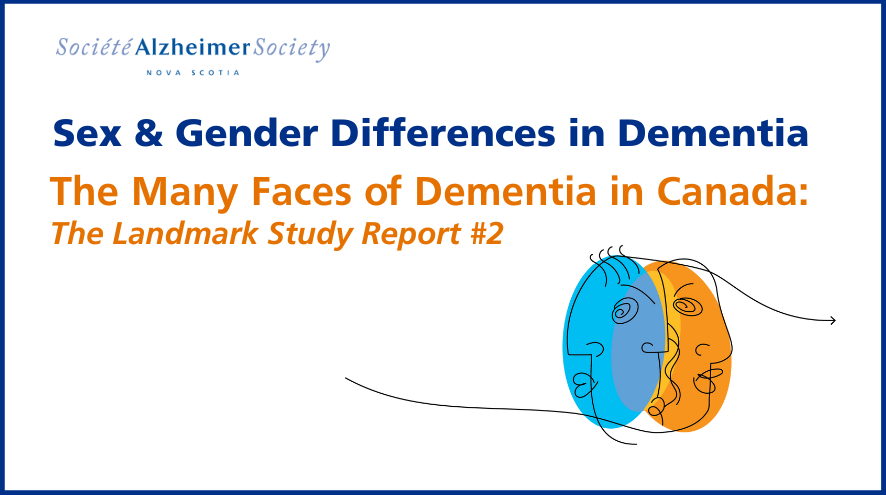Sex & Gender Differences in Dementia
Learn more about sex & gender differences in dementia.

In January, the Alzheimer Society of Canada released the second volume of the Landmark Study, The Many Faces of Dementia in Canada.
Over the next year, we'll be releasing education pages on each chapter. You'll have the opportunity to learn more about this study, what it means for Nova Scotians, and what resources are available to help. We will share local statistics, identify resources, and hear from Nova Scotians about ways in which their cultures and social identities are related to their experience on the dementia journey.
Today we’re talking about Chapter 4, Sex and Gender Differences in Dementia (read this chapter here). This chapter covers definitions of sex and gender and related risk factors. It explores why differences in dementia exist based on sex at birth. The chapter also speaks about the social construction of gender identities and roles, and the impacts on risk, diagnosis and caregiving.
One of the main premises is that women are disproportionately affected by dementia; both directly and indirectly. Females live longer than males, so the difference in life span is one factor that contributes to more females being diagnosed with dementia.
“In addition to sex differences such as longevity, gender differences in education, occupation, social isolation and stress among others can also increase dementia risk in women,” says Rosanne Burke, Manager of Advocacy at the Alzheimer Society of Nova Scotia. “Understanding the full brain health story around sex and gender risk factors is critical to providing appropriate care and for systems-level changes needed to address the disproportionate risk that women face.”
The report acknowledges that dementia research at-large has not yet begun to address the challenges and experiences that may face intersex, non-binary and trans people who develop dementia.
“Much more research needs to be done to better understand and support gender-diverse people affected by dementia,” says Marco Redden, Research and Evaluation Lead at the Alzheimer Society of Nova Scotia. “Studies to date show that trans and non-binary adults may be at higher risk of developing dementia. To advance understanding, researchers need to build the trust of gender-diverse people, especially those who have faced discrimination within healthcare and other systems. I’m grateful to the queer- and trans-led dementia research teams currently leading this work in Canada.”
Click here for a fact sheet about Chapter 4, where you can learn more about the numbers and statistics.
Resources connected to this Chapter can be found here:
- (Video) Turning up the Volume on 2SLGBTQIA+ Needs in the Dementia Space
- (Video) Women and Dementia: Understanding sex/gender differences in the brain
- (Video) A discussion on women, brain health and dementia
- Women and Dementia: a global research review
- Women’s Mind Matters
- Help Us Remain - Egale Canada
Stay tuned for our next blog in the Fall where we will be looking at Chapter 2, Dementia and Indigenous Peoples.
If you see yourself in this report, or are a community organization or healthcare provider and have suggestions on how we can better support you and your community, we invite you to contact us by email at [email protected] or phone at 1-800-611-6345.
